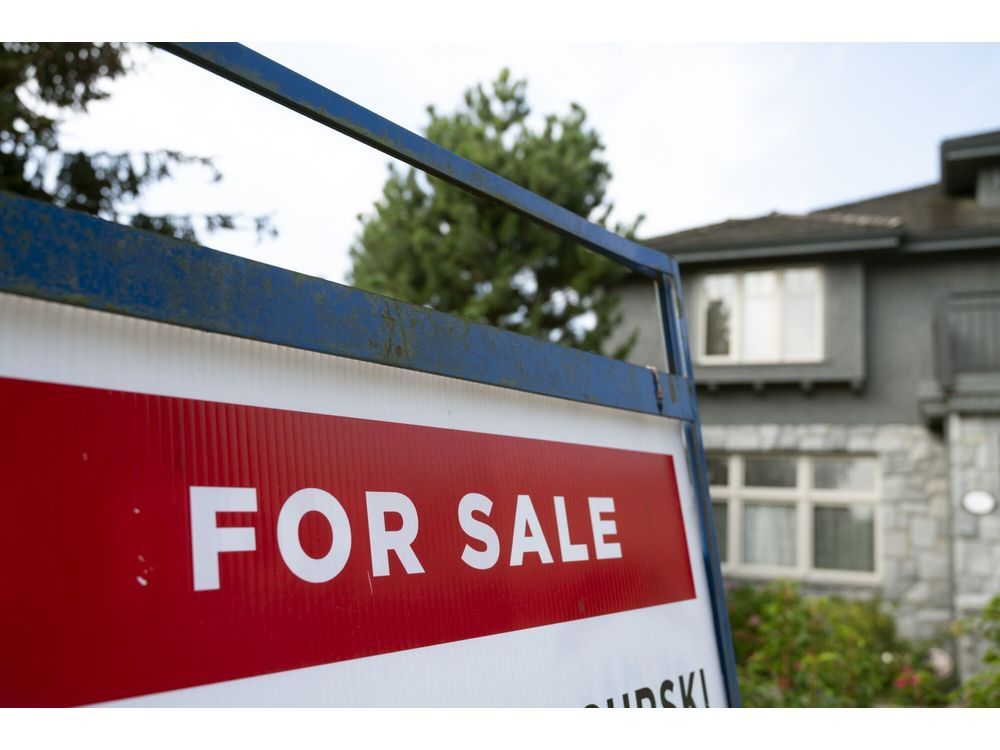Trudeau promises Biden ‘quick action’ on blockades
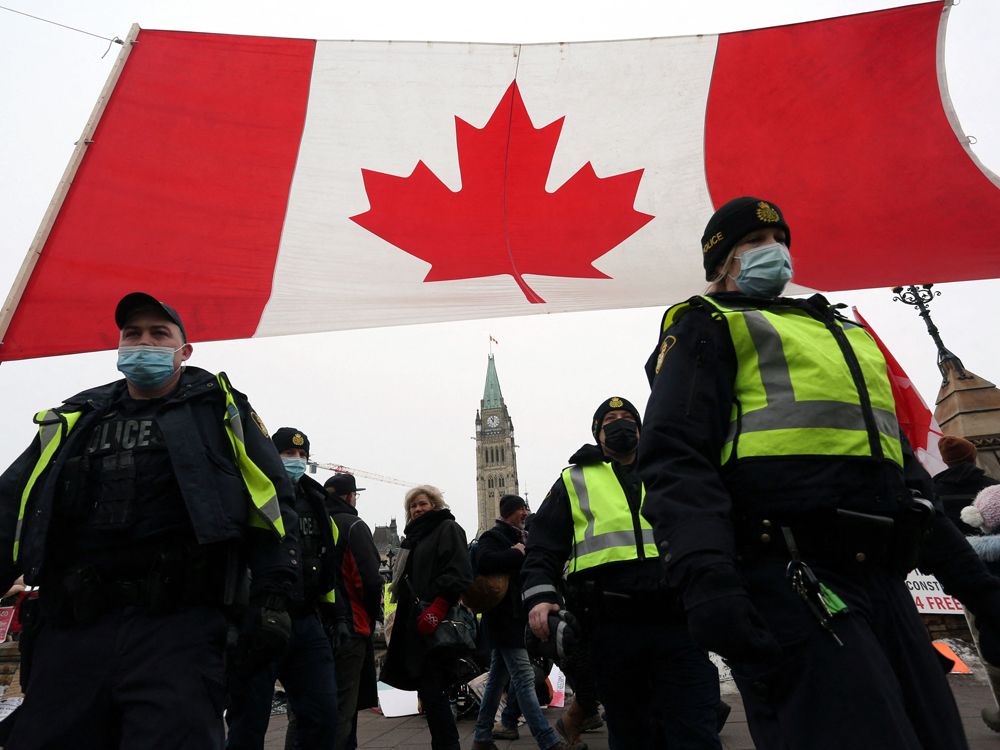
Protests against COVID-19 restrictions are starting to threaten the economy. Here’s today’s coverage
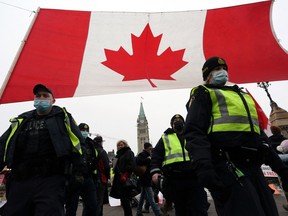
Article content
This week blockades inspired by the so-call Freedom Convoy that descended on Ottawa on Jan. 28, have closed three U.S.-Canada border crossings, including the crucial Ambassador Bridge between Detroit and Windsor, which is responsible for US$13.5 million per hour in economic activity, according to the Windsor-Essex Regional Chamber of Commerce.
Advertisement
Story continues below
This advertisement has not loaded yet, but your article continues below.
Article content
The major auto plants in the region have been forced to pause lines because of a shortage of parts.
The demonstrations began as a protest against the federal government’s move to require that Canadian truck drivers crossing the U.S. border be fully vaccinated. It has since evolved into a protest against all public health measures aimed at fighting the COVID-19 pandemic.
As the disruption continues, fears grow about the impact this will have on the economy.
Here are the latest updates on what is happening today.
5:00 p.m.
Trudeau says banks monitoring financial activity supporting blockades
Prime Minister Justin Trudeau suggested Friday that Canadian banks are playing a role in monitoring financial activity that could be supporting the blockades.
Advertisement
Story continues below
This advertisement has not loaded yet, but your article continues below.
Article content
“Over the past two weeks, we have observed that funding has been supplied to support the blockades and this is from abroad,” Trudeau said. “Canadian banks are monitoring financial activity very closely and taking action that’s necessary.”
The Canadian Bankers Association declined to elaborate on Trudeau’s statement about what, specifically, is being done by the banks, which have defined responsibilities when it comes to weeding out money laundering and terrorist financing activities.
For example, banks must report to the Financial Transactions and Reports Analysis Centre of Canada (FINTRAC) any transaction of $10,000 or more, including multiple transactions totalling $10,000 or more in a consecutive 24-hour period.
Advertisement
Story continues below
This advertisement has not loaded yet, but your article continues below.
Article content
This includes international electronic funds transfers, virtual currency transfers, and “suspicious” transactions, which can be reported even if they don’t reach $10,000.
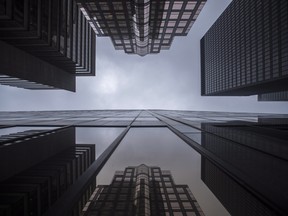
Crowdfunding sites such as GoFundMe and GiveSendGo — which have been used to solicit funds for the protests — are not a regulated business under the Proceeds of Crime (Money Laundering) and Terrorist Financing Act, according to Barry MacKillop, deputy director of intelligence at FINTRAC, who appeared before the House of Commons committee on public safety and national security on Thursday.
However, “when these sites transact with or through” entities that are subject to the regulations, “these financial transactions would also be covered under the Act,” MacKillop told committee members, according to a draft of his remarks.
Advertisement
Story continues below
This advertisement has not loaded yet, but your article continues below.
Article content
MacKillop noted that FINTRAC, one of 13 federal departments and agencies mandated to help detect, prevent, and deter of money laundering and the financing of terrorist activities, does not have authority to freeze or seize funds, or cancel or delay financial transactions.
If FINTRAC determines that information it has received would be relevant to police or national securities agencies, it confidentially passes the information along to those agencies.
A spokesperson for FINTRAC declined to comment on Trudeau’s remarks Friday, referring the inquiry to the prime minister’s office.
Canada’s top banking regulator, the Office of the Superintendent of Financial Institutions (OSFI), also declined to comment on Trudeau’s remarks about what the banks are doing.
Advertisement
Story continues below
This advertisement has not loaded yet, but your article continues below.
Article content
— Barbara Shecter
4:00 p.m.
Ottawa sketches outline of way out of pandemic restrictions
The federal government appears set to loosen international travel restrictions next week.
“With the worst of Omicron now behind us, the government is actively reviewing the measures put in place at our borders and we should be able to communicate changes on this next week,” Jean-Yves Duclos, the health minister, said at a press conference today.
Duclos didn’t say specifically which measures he’d loosen. But he did sketch an outline of the parameters that will inform the severity of restrictions going forward as countries learn to live with the virus.
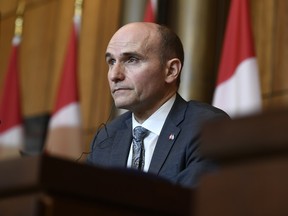
Among the signposts Duclos said he will be watching are death rates, stating that, “living with the virus means people have to stop dying from it in such large numbers.” He also suggested that at least some restrictions will remain in place until authorities can be certain the health system can handle greater levels of illness.
Advertisement
Story continues below
This advertisement has not loaded yet, but your article continues below.
Article content
“Living with the virus means the virus and our health-care system must be able to coexist without the latter being paralyzed, without cancer patients being told that their surgeries will have to wait because our hospitals and our health-care workers are overwhelmed by COVID-19,” the minister said.
Duclos ended his opening statement by urging everyone to get vaccinated. “If we can prevent severe complications, our hospitals and health-care workers will not be overwhelmed,” he said. “If our hospitals and health-care workers are not overwhelmed, then in turn public health restrictions will be less severe.”
— Kevin Carmichael
3:25 p.m.
Ford Motor Co.’s two plants in Ontario — Oakville and Windsor — are still running at reduced capacity. A line is also down in Ohio now due to the protests.
Advertisement
Story continues below
This advertisement has not loaded yet, but your article continues below.
Article content
“This interruption on the Detroit/Windsor bridge hurts customers, auto workers, suppliers, communities and companies on both sides of the border that are already two years into parts shortages resulting from the global semiconductor issue, COVID and more.
“We hope this situation is resolved quickly because it could have widespread impact on all automakers in the U.S. and Canada. Today our plants in Oakville and Windsor are running at reduced capacity. Ohio Assembly Plant is down as a result of a part shortage associated with this situation,” said a spokesperson for Ford.
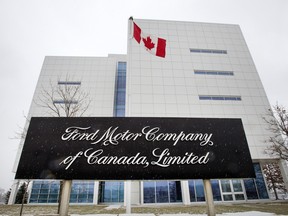
— Bianca Bharti
2:51 p.m.
‘The border cannot and will not remain closed’
Justin Trudeau’s press conference that ended at 2:47 p.m. came after a call with U.S. President Joe Biden today in which the two leaders agreed that the Canadian protests were having “significant direct impacts” on the two countries.
Advertisement
Story continues below
This advertisement has not loaded yet, but your article continues below.
Article content
Biden expressed concern that U.S. companies are experiencing slowdowns in production and plant closures as a result and Trudeau “promised quick action in enforcing the law,” the White House said in a statement.
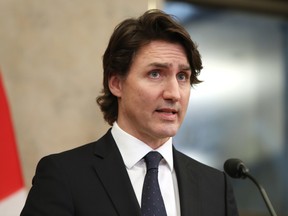
“President Biden and I both agree that for the security of the people and the economy, these blockades cannot continue. So make no mistake. The border cannot and will not remain closed,” Trudeau said in the press conference later.
Trudeau said the president “expressed concern” about the protest against COVID mandates spreading around the world, particularly south of the border.
“He expressed concern not just for the impacts right now, but the indication that there is international support from the United States and from elsewhere around the world for these protests,” Trudeau said at the press conference.
Advertisement
Story continues below
This advertisement has not loaded yet, but your article continues below.
Article content
“We’ve seen that the attack, for example, in the Ottawa 911 system came from the United States.
“We see that almost half of the funding through certain portals that is flowing to the barricaders here in Canada is coming from the United States. We see a mobilization of some of the more challenging political elements in Canada and in the United States around support for these blockades that are hurting citizens.”
— Bianca Bharti
2:32 p.m.
“The border cannot and will not remain closed,” Prime Minister Justin Trudeau stressed in a press conference on the blockades.
When asked if the army would be called in, Trudeau said the focus now is on police action and the government is not considering military intervention at this time.
Advertisement
Story continues below
This advertisement has not loaded yet, but your article continues below.
Article content
“We are a long way from ever having to call in the military,” he said.
* * *
“Over the past two weeks, we have observed that funding has been supplied to support the blockades and this is from abroad. Canadian banks are monitoring financial activity very closely and taking action that’s necessary.” — Trudeau
Trudeau said funds coming from the U.S. supporting the protests is nearing 50 per cent on some platforms. He didn’t disclose which platforms, but cryptocurrencies have become a choice payment for protesters trying to evade tracking.
— Bianca Bharti
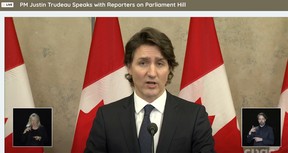
2:17 p.m.
Advertisement
Story continues below
This advertisement has not loaded yet, but your article continues below.
Article content
2:13 p.m.
Auto makers forced to fly in parts

A cargo 737 takes off from London, Ont. airport Friday heading back to Michigan for another load of parts while another cargo plane waits on the tarmac. London airport observers say that the amount of auto-related cargo has skyrocketed over the past few days after the closure of the Ambassador bridge in Windsor.
V-6 engines were seen being moved on pallets as vital cargo circumvents the border blockades, with short flights from Michigan to London, supplying CAMI, Woodstock Toyota and Cambridge.
Photo by Mike Hensen/The London Free Press/Postmedia Network
1:31 p.m
Blockades could ‘materially’ impact GDP
Protests and disruptions to key trade routes in Canada will lead to raised prices and shortages of some goods that could hit GDP and derail inflation expectations, an economist at Desjardins said.
Advertisement
Story continues below
This advertisement has not loaded yet, but your article continues below.
Article content
“Some studies show that rising prices for frequently purchased goods such as food tend to have a greater influence on consumer expectations,” Royce Mendes wrote in a client note Friday.
“Most experts believe that the situation will be resolved soon, as governments take increasingly serious steps to end the occupations. But that optimism needs to be balanced against the possibility for second-round effects and the potential for further blockades.”
The longer the protests fracture supply chains, the more likely it will become that blockades “will materially impact first quarter GDP in Canada,” he said. Economists were already anticipating a first-quarter hit to GDP due to the resurgence of COVID-19 and its impact on jobs and businesses after preliminary December estimates showed the economy grew 6.6 per cent, annualized, in the final quarter of 2021.
Advertisement
Story continues below
This advertisement has not loaded yet, but your article continues below.
Article content
Blockades have caused some manufacturers in the auto industry to temporarily shut down production and Alberta cattle ranchers aren’t getting enough feed for their animals.
But don’t expect the Bank of Canada Governor Tiff Macklem to shift course on raising interest rates, Mendes said. Macklem’s focus will remain on guiding inflation back down to the central bank’s target range of between one and three per cent, especially as convoy-induced blockades increase shortages of food and cars, jacking up prices. Inflation hit a three-decade high in Canada in December, climbing 4.8 per cent year-over-year.
“The Bank of Canada is much more focused on lifting rates in the coming months than it is on fine tuning the real economy,” Mendes said. “Neither the 200K jobs lost in January nor the untimely disruptions to trade and production from these blockades will keep the Bank of Canada from raising rates in March.”
Advertisement
Story continues below
This advertisement has not loaded yet, but your article continues below.
Article content
— Bianca Bharti
12:53 p.m.
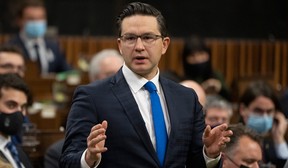
Conservative leadership candidate Pierre Poilievre says he is “proud” of the truckers and stands with them.
Poilievre also says he blames Prime Minister Justin Trudeau for the situation, which is paralyzing critical infrastructure at the border.
“I’m proud of the truckers and I stand with them,” Poilievre said in an interview recorded on Thursday for next week’s episode of the Postmedia podcast Full Comment with Anthony Furey.
“They have reached a breaking point after two years of massive government overreach of a prime minister who insults and degrades anyone who disagrees with his heavy-handed approach.
“But let’s be honest, if Canadians are being inconvenienced, or in any way suffering from these protests, it is because Justin Trudeau made these protests happen and his intransigence is keeping the protests going,” he added.
Advertisement
Story continues below
This advertisement has not loaded yet, but your article continues below.
Article content
— Catherine Lévesque
12:38 p.m.
‘Economic terrorism’
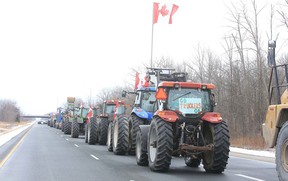
Doug Ford isn’t the only politician with strong words for the protesters. Sarnia Mayor Mike Bradley is calling a blockade that has shut down part of Highway 402 “economic terrorism.”
Protesters are blocking one lane by parking 20 farm vehicles on the highway that runs between the Strathroy-area and Sarnia where the Bluewater Bridge crossing into Michigan is located, reports the Sarnia Observer. They say they won’t block the border.
“This is an illegal action, it is economic terrorism,” Bradley said, noting the difference between frequent city hall protesters and a highway shutdown.
— Sarnia Observer
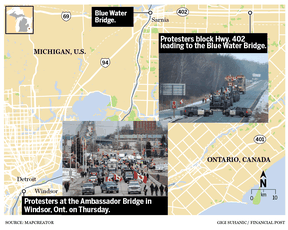
11:45 a.m.
Canada has a long history of protesters blocking trade routes
Advertisement
Story continues below
This advertisement has not loaded yet, but your article continues below.
Article content
Ontario’s move to enact a state of emergency is a signal to Canada’s trade partners that the country is a reliable and safe place to do business, Premier Doug Ford said Friday.
“The trade problems that we would see if we didn’t clear the Ambassador Bridge would be unprecedented. We said Ontario is open for business, and we will always be open for business,” Ford said in a press conference.
His comments come amid growing fears that ongoing blockades could turn up the heat on American protectionism measures.
Indeed, protests blocking key trading ports between the U.S. and Canada will add fire to politicians who already endorse protectionist trade policies, said Carlo Dade, director of trade and investment at the think-tank Canada West Foundation.
Advertisement
Story continues below
This advertisement has not loaded yet, but your article continues below.
Article content
“I wouldn’t overhype this and say that this is decisive and we’ll have orders cancelled left and right,” Dade said in an interview. “But you have to look at this as an accumulation of several events that have made it into foreign media.”
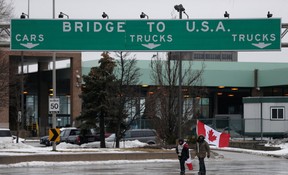
Canada has a history with people blocking trade routes, he said, whether it’s environmental protestors or Indigenous land-keepers fighting to save their territories from industry damage and encroachment.
“We’re trying to sell ourselves as reliable suppliers (of goods),” he said, adding that this protest is more severe and longer-lasting. “Those that are doing the blockading are actually the producers of goods that we ship abroad and the people responsible for shipping them.”
Advertisement
Story continues below
This advertisement has not loaded yet, but your article continues below.
Article content
Ambarish Chandra, a professor at University of Toronto’s Rotman School of Management, said that it could add fuel to political fervour, but ultimately it’s private corporations that will decide whether to move operations to their home countries if trade is disrupted.
The protests are “not really going to cause American firms to start actively looking to relocate but the longer this goes on,” Chandra said, “then you could see companies make active plans to relocate.”
Said Dade: “Blocking exports is, I would argue, a much more troubling signal and it’s being picked up. We’re tracking it in the form of media and we’re seeing 20 to 40 reports a day in papers in the Indo-Pacific.”
Advertisement
Story continues below
This advertisement has not loaded yet, but your article continues below.
Article content
— Bianca Bharti
10:56 a.m.
Ontario declares state of emergency
Ontario Premier Doug Ford declared a state of emergency on Friday following more than two weeks of protests in Ottawa and a week of protests along key Canada-U.S. trade routes.
“Our economy in Ontario is built on trade, especially with our partners in the United States. The Ambassador Bridge in Windsor alone sees more than $700 million of two way trade every single day,” Ford said at a press conference. “We’re now two weeks into the siege of the city of Ottawa. I call it a siege because that’s what it is. It’s an illegal occupation. This is no longer a protest.”
Ford was joined by Solicitor General Sylvia Jones and Minister of Transportation Caroline Mulroney. Jones clarified that the initial emergency declaration will be for 42 hours and further amendments to the law will be made to address public safety issues.
Advertisement
Story continues below
This advertisement has not loaded yet, but your article continues below.
Article content
The emergency order will give powers to the government and police to arrest and fine protesters blocking the movement of goods and services along critical infrastructure, including on highways, airports, bridges, railways and ports. Non-compliance with emergency orders can yield fines of up to $100,000 and a year in prison, the premier said. On top of that, protesters infringing on orders can have their personal and commercial licences taken away.
Advertisement
Story continues below
This advertisement has not loaded yet, but your article continues below.
Article content
The premier added: “Folks, I got to stress to you: we’re in a critical situation worldwide economically. We have competitors breathing down our back on a daily basis. We’re competing against our neighbours south of the border. We’re competing against the rest of the world and the last thing we need is an anchor around our neck when we’re competing. These people need to make sure they leave the Ambassador Bridge immediately for the sake of hundreds of thousands of workers, millions of families that depend on a paycheque going into these factories, going into these auto plants, making sure food gets distributed up here. That’s what this is all about.”
— Bianca Bharti
10:34 a.m.
Latest from Windsor front lines
Advertisement
Story continues below
This advertisement has not loaded yet, but your article continues below.
Article content
10:25 a.m.
Ontario Premier Doug Ford is set to make an announcement at 10:30 a.m about the blockades.
He will be joined by Solicitor General Sylvia Jones, Attorney General Doug Downey and Minister of Transportation Caroline Mulroney.
9:39 a.m.
The Ambassador Bridge blockade is stoking a sentiment protesters most likely didn’t intend — American protectionism. Check out the tweet below from Michigan Rep. Elissa Slotkin.
Advertisement
Story continues below
This advertisement has not loaded yet, but your article continues below.
Article content
Slotkin was complaining because a General Motors plant outside Lansing is being starved of parts from Canada by the ongoing closure of the border crossing between Detroit and Windsor, Ont.
“The one thing that couldn’t be more clear is that we have to bring American manufacturing back home to states like Michigan. If we don’t, it’s American workers like the folks at Delta Township who are left holding the bag,” Slotkin wrote in another tweet.
— Canadian Press
9:31 a.m.
Ontario freezes protest’s funds
The Ontario government has moved to freeze $8 million going to the crippling trucker blockades in Windsor and Ottawa as local leaders continue to ask for help from all levels of government to end the protests.
Late Thursday, Premier Doug Ford’s government announced they had obtained a court order freezing the funds raised through GiveSendGo, an online fundraising platform that the truckers turned to when GoFundMe closed a previous effort. The GiveSendGo page indicated more than $8 million had been raised through the platform, but the protest convoy was also raising money through private transfers and through cryptocurrency.
Advertisement
Story continues below
This advertisement has not loaded yet, but your article continues below.
Article content
— Ryan Tumilty
9:03 a.m.
Magna starting to feel the pinch
The CEO of vehicle-systems-maker Magna International Inc. said the Aurora, Ont. company is beginning to see “some initial impact” from the blockades.
“Some of the OEM [Original Equipment Manufacturer] customers have had to idle or they’re adjusting production schedules,” Seetarama Kotagiri told analysts during an earnings call on Friday. “We’re kind of starting to see some initial impacts in some areas versus the others, for example, facilities and so on. So we’re watching closely.”
Magna reported a 14-per-cent drop in sales to US$9.1 billion for its fourth quarter ended Dec. 31, 2021. It attributed COVID-19 disruptions and semiconductor shortages to the year-over-year decline.
Advertisement
Story continues below
This advertisement has not loaded yet, but your article continues below.
Article content
— Bianca Bharti
8:32 a.m.
Super Bowl next target?
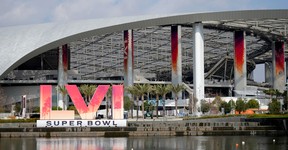
Meanwhile in America, police are being warned by Homeland Security that Canadian-style trucker convoys could disrupt the Super Bowl this weekend in Los Angeles, as well as President Biden’s first State of Union address.
A memo by the department, which oversees border controls, warns that truckers in the U.S. may stage solidarity protests with the Freedom Convoy truckers in Canada, The Hill and other media are reporting.
The DHS memo said the department has received reports of truck drivers potentially planning to block roads in major metropolitan cities in the United States in protest of, among other things, vaccine mandates, according to The Hill.
“The convoy will potentially begin in California early as mid-February, potentially impacting the Super Bowl scheduled for 13 February and the State of the Union address scheduled for 1 March,” according to the memo obtained by The Hill.
The convoy of truckers plans to travel from California to Washington — and Canadian truckers may join — the memo notes. While there are no plans for violence, it warns of disruptions to major cities.
— National Post Staff
8:07 a.m.
Update from Honda Canada
“Due to border delays, Honda of Canada Mfg. in Alliston, Ontario is scheduled to temporarily suspend manufacturing on one production line during the day shift on Friday, February 11. All Honda automotive manufacturing operations in the U.S. are currently scheduled to run production on Friday, February 11. As this remains a fluid situation, we are monitoring the disruption of transportation between Canada and the U.S. and will adjust production as necessary.”
7:44 a.m.
Prime Minister Justin Trudeau, who is facing increasing pressure from U.S. President Joe Biden’s administration to end the blockades at the border, convened a meeting of the Incident Response Group, a dedicated emergency committee on standby for national crises, on Thursday night, Politico reported. Trudeau then met with Windsor Mayor Drew Dilkens before assembling the leaders of the federal opposition parties for a meeting, the publication said.
7 a.m.
It could be an eventful day on the blockade front as standoffs loom between protesters and government officials desperate to get the economy moving again.
Windsor, Ontario is seeking a court injunction to end the protest, setting the stage for a potential confrontation with demonstrators. A provincial court will hear the application at 12 p.m. ET today, a city spokesperson told Bloomberg. A court order would clear the path for police to make arrests or tow vehicles to clear the streets, if necessary, Windsor Mayor Drew Dilkens said.
As of 6 a.m. this morning, Canada border services were still listing the Ambassador Bridge, North America’s main land crossing in Windsor, as “temporarily closed.”
The U.S./Canada crossing at Coutts, Alberta, where another protest is going on, is showing seven-hour delays.
Additional reporting by Canadian Press, Reuters and Bloomberg
Advertisement
Story continues below
This advertisement has not loaded yet, but your article continues below.






